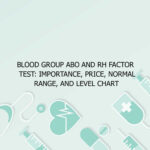Now Reading: Complete Serum Electrolytes Test: Importance, Price, Normal Range and Level Chart
- 01
Complete Serum Electrolytes Test: Importance, Price, Normal Range and Level Chart
Complete Serum Electrolytes Test: Importance, Price, Normal Range and Level Chart
The Complete Serum Electrolytes Test is a crucial diagnostic tool in medical practice, as it evaluates the levels of essential electrolytes in the blood, which are critical for maintaining the body’s fluid balance, nerve signaling, and muscle function. Electrolytes, such as sodium, potassium, chloride, bicarbonate, calcium, magnesium, and phosphate, are charged minerals that play a vital role in almost every physiological process. The test is commonly performed in routine health checkups, before surgeries, and for diagnosing or monitoring conditions such as dehydration, kidney disease, heart disorders, metabolic imbalances, and certain hormonal issues.
Electrolytes are not just basic minerals; they are the “electricity carriers” of the human body. They regulate the heartbeat, assist in muscle contraction, balance pH levels, and ensure proper hydration in and around cells. A slight imbalance can lead to significant health issues — from mild fatigue to life-threatening arrhythmias. Therefore, the Complete Serum Electrolytes Test serves as both a preventive and diagnostic measure.
The test typically involves a simple blood draw from a vein in the arm. It is usually ordered by physicians when a patient presents symptoms such as weakness, confusion, irregular heartbeat, dehydration, swelling, or unexplained fatigue. In hospitalized patients, especially those in intensive care, electrolyte levels may be checked multiple times a day to monitor critical conditions.
Importance of Complete Serum Electrolytes Test
The importance of the Complete Serum Electrolytes Test lies in its ability to detect imbalances early, which allows for timely intervention and prevention of complications. Electrolyte disturbances can occur due to a wide range of conditions, including vomiting, diarrhea, kidney dysfunction, hormonal imbalances, certain medications, and chronic diseases.
For example:
- Sodium (Na⁺) regulates water balance and blood pressure. Low sodium (hyponatremia) can cause headaches, confusion, and seizures, while high sodium (hypernatremia) can lead to dehydration and neurological damage.
- Potassium (K⁺) plays a key role in nerve signaling and muscle contraction. Even minor deviations can trigger cardiac arrhythmias.
- Chloride (Cl⁻) helps maintain fluid balance and acid-base balance. Abnormalities are often linked to metabolic or respiratory disorders.
- Bicarbonate (HCO₃⁻) acts as a buffer for pH balance, indicating metabolic or respiratory acidosis/alkalosis.
- Calcium (Ca²⁺) supports bone health, nerve signaling, and blood clotting.
- Magnesium (Mg²⁺) is essential for muscle function, enzyme activity, and nerve conduction.
- Phosphate (PO₄³⁻) is vital for energy production and bone integrity.
Detecting abnormalities promptly ensures that treatment, such as fluid replacement, medication adjustments, or dietary modifications, can be implemented quickly.
Price of Complete Serum Electrolytes Test in India
In India, the cost of a Complete Serum Electrolytes Test can vary based on the city, healthcare facility, and whether it is part of a larger health package.
- Average price range: ₹300 to ₹800 for a basic electrolyte panel (Sodium, Potassium, Chloride, Bicarbonate)
- Extended panel with calcium, magnesium, phosphate: ₹700 to ₹1500
- Hospital-based emergency testing: ₹1000 to ₹2000, depending on urgency and additional parameters tested
Government hospitals or charitable diagnostic centers often offer the test at lower costs, sometimes below ₹200, while private premium labs may charge higher prices. When the test is bundled with other metabolic or kidney function tests, overall package costs can vary significantly.
Normal Range and Level Chart for Complete Serum Electrolytes Test
| Electrolyte | Normal Range |
|---|---|
| Sodium (Na⁺) | 135 – 145 mmol/L |
| Potassium (K⁺) | 3.5 – 5.1 mmol/L |
| Chloride (Cl⁻) | 98 – 107 mmol/L |
| Bicarbonate (HCO₃⁻) | 22 – 29 mmol/L |
| Calcium (Ca²⁺) | 8.5 – 10.5 mg/dL |
| Magnesium (Mg²⁺) | 1.7 – 2.2 mg/dL |
| Phosphate (PO₄³⁻) | 2.5 – 4.5 mg/dL |
These ranges can vary slightly depending on the laboratory and patient’s age, sex, and clinical condition.
10 FAQs about Complete Serum Electrolytes Test
What is a Complete Serum Electrolytes Test and why is it performed?
A Complete Serum Electrolytes Test measures the levels of essential electrolytes in the bloodstream, including sodium, potassium, chloride, bicarbonate, calcium, magnesium, and phosphate. These minerals carry electrical charges that enable critical bodily functions such as nerve conduction, muscle contraction, fluid balance, and pH regulation. The test is performed to detect imbalances that can result from dehydration, kidney disease, hormonal disturbances, metabolic disorders, or the effects of certain medications. It is also used to monitor patients receiving IV fluids, diuretics, or treatments affecting electrolyte levels. By providing a detailed picture of a patient’s electrolyte status, doctors can diagnose underlying issues, guide treatment decisions, and prevent complications such as arrhythmias, seizures, or metabolic crises.
When should a person get a Complete Serum Electrolytes Test?
A person should get a Complete Serum Electrolytes Test if they are experiencing symptoms such as persistent fatigue, confusion, muscle weakness, irregular heartbeat, nausea, vomiting, swelling, or dehydration. The test is also recommended for people with chronic conditions like kidney disease, diabetes, heart failure, or endocrine disorders. In hospital settings, the test may be ordered for patients on ventilators, those with severe infections, or those undergoing surgery. Regular monitoring may also be necessary for athletes, individuals on restrictive diets, or patients taking medications like diuretics or steroids. Detecting and addressing electrolyte imbalances early can prevent life-threatening consequences.
What can cause electrolyte imbalance?
Electrolyte imbalances can be caused by numerous factors including dehydration, excessive sweating, vomiting, diarrhea, kidney dysfunction, hormonal disorders like adrenal insufficiency, uncontrolled diabetes, or certain medications such as diuretics, laxatives, and chemotherapy drugs. Infections, severe burns, liver disease, and malnutrition can also disturb electrolyte levels. Some imbalances are acute and reversible, while others are chronic and require long-term management. The cause determines whether the imbalance is due to excess loss, excess intake, or a shift of electrolytes between body compartments.
How is the Complete Serum Electrolytes Test performed?
The test is performed through a venous blood draw, usually from a vein in the arm. The skin is cleaned with an antiseptic, a tourniquet is applied, and a needle is inserted to collect blood into a tube. The procedure is quick, usually taking less than five minutes, and carries minimal risks such as mild pain, bruising, or dizziness. The sample is then sent to a laboratory, where levels of sodium, potassium, chloride, bicarbonate, calcium, magnesium, and phosphate are measured using automated analyzers. Results are typically available within a few hours.
Can fasting affect electrolyte levels?
Fasting for short periods usually does not significantly alter electrolyte levels in healthy individuals. However, prolonged fasting or severe calorie restriction, especially when combined with dehydration, can cause imbalances. For example, lack of water intake can raise sodium levels, while inadequate nutrition can lead to low potassium, magnesium, or phosphate. Doctors may advise fasting if the test is part of a larger metabolic panel, but for electrolytes alone, fasting is not always necessary unless instructed.
What are the dangers of abnormal electrolyte levels?
Abnormal electrolyte levels can have serious consequences. High potassium can cause life-threatening heart arrhythmias, while low potassium can lead to muscle weakness and paralysis. Low sodium may result in seizures and brain swelling, while high sodium can cause dehydration and confusion. Abnormal calcium levels affect bone health, muscle function, and clotting. Magnesium imbalances impact nerve conduction and heart rhythm, and phosphate imbalances interfere with energy production. Untreated disturbances can lead to coma or death, making early detection vital.
How are electrolyte imbalances treated?
Treatment depends on the cause and severity of the imbalance. Mild cases may be corrected through dietary changes, oral supplements, or adjusting medications. Severe cases may require intravenous fluids or electrolytes under medical supervision. For example, low potassium may be treated with potassium chloride infusions, while high potassium may require medications to shift potassium into cells or remove it from the body. In kidney failure, dialysis may be needed to restore balance.
Can lifestyle changes maintain electrolyte balance?
Yes. Maintaining a balanced diet rich in fruits, vegetables, dairy, nuts, and lean proteins ensures adequate intake of essential minerals. Staying hydrated, avoiding excessive alcohol and caffeine, and managing chronic illnesses also help. Athletes should replace electrolytes lost through sweating with sports drinks or electrolyte supplements. Regular health checkups and monitoring are important for individuals at risk of imbalances.
Is the Complete Serum Electrolytes Test safe for pregnant women?
Yes, the test is safe for pregnant women and is often used to monitor electrolyte status during pregnancy, especially in cases of severe morning sickness, preeclampsia, or gestational diabetes. Electrolyte balance is essential for both maternal and fetal health.
How often should the test be repeated?
Frequency depends on the patient’s condition. Healthy individuals may need it only during routine checkups, while patients with chronic illnesses or those in hospitals may require daily or weekly monitoring.
10 Suggested Medical Journal Titles with Authors
- “Electrolyte Homeostasis in Critical Care Patients” – Dr. Anil Mehta
- “Impact of Potassium Imbalance on Cardiac Arrhythmias” – Dr. Radhika Sharma
- “Role of Magnesium in Neuromuscular Health” – Dr. Vivek Rao
- “Sodium Disorders: Diagnosis and Management” – Dr. Preeti Menon
- “Electrolyte Changes in Chronic Kidney Disease” – Dr. Mohan Verma
- “Bicarbonate and Acid-Base Disorders” – Dr. Karan Singh
- “Phosphate Metabolism in Bone Health” – Dr. Neha Kapoor
- “Electrolyte Monitoring in Endocrine Disorders” – Dr. Alok Gupta
- “Pediatric Electrolyte Imbalances: Clinical Implications” – Dr. Sonia Iyer
- “Hydration and Electrolyte Balance in Athletes” – Dr. Rajesh Nair









